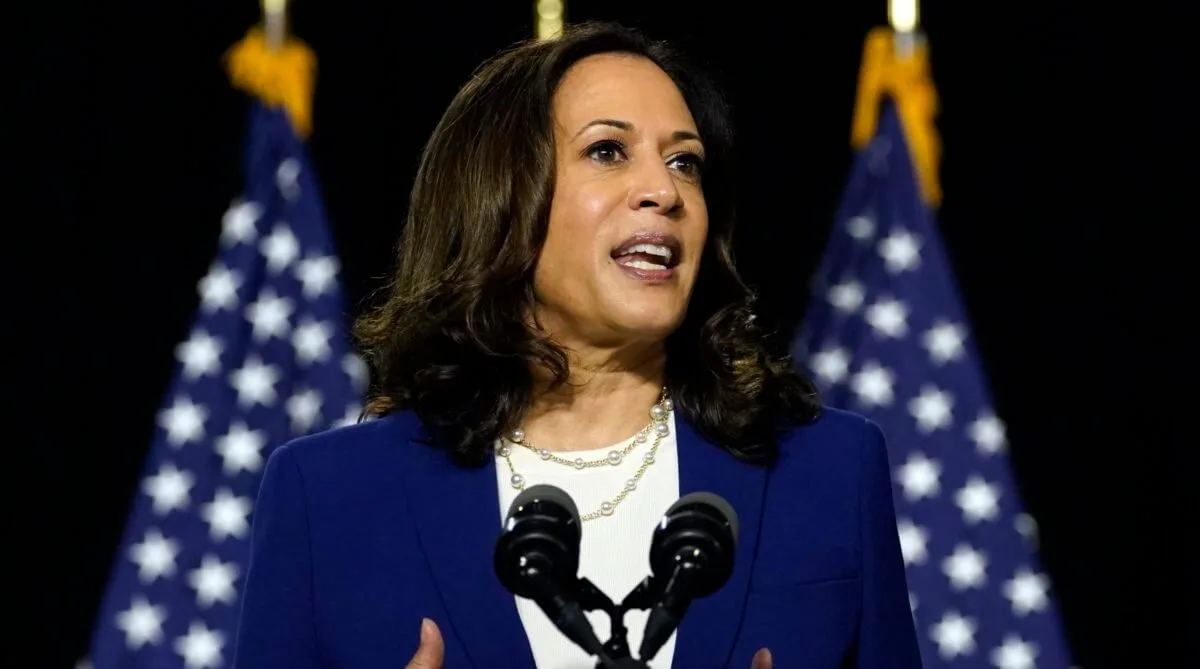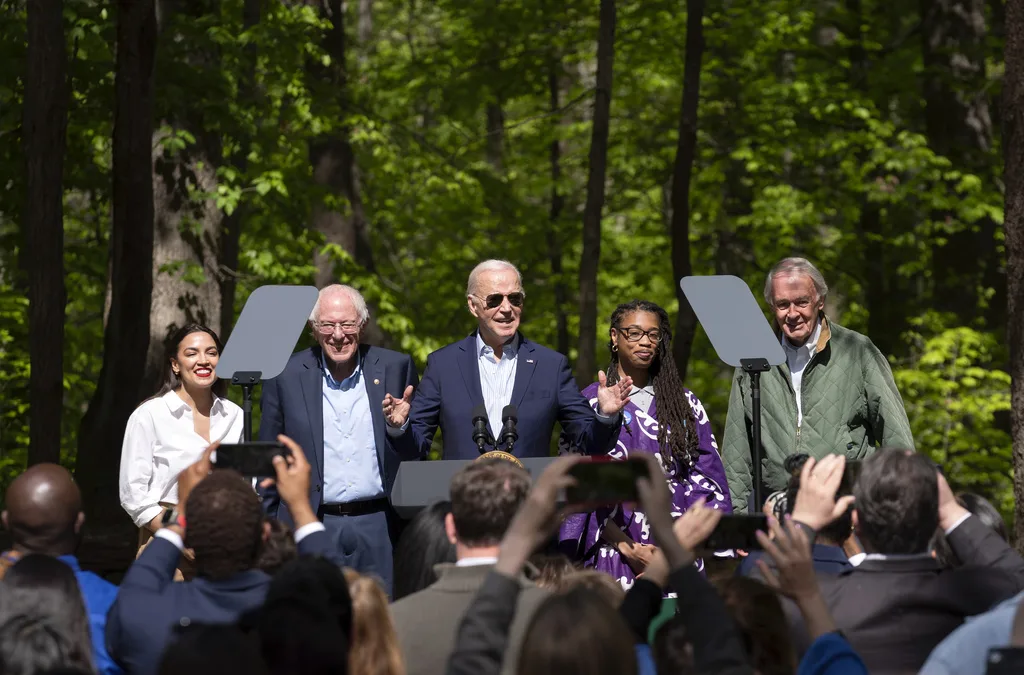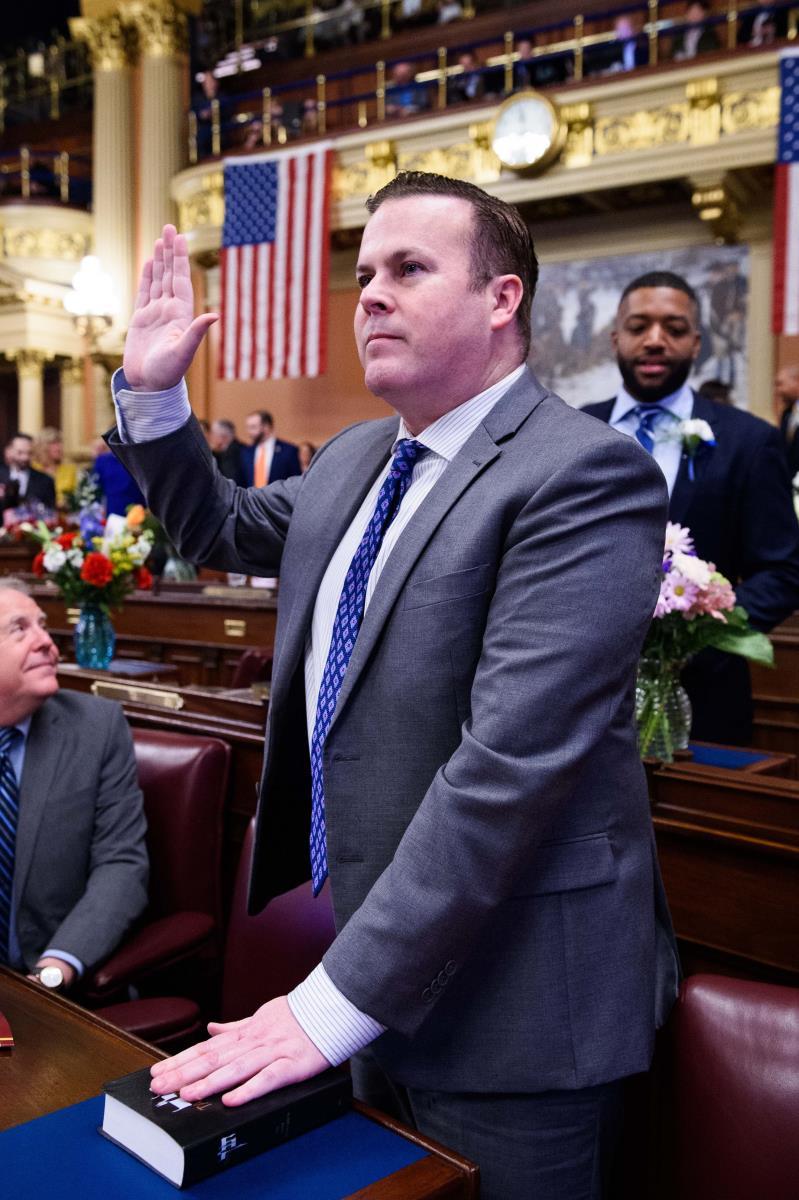
Sen. Kamala Harris, D-Calif., speaks after Democratic presidential candidate former Vice President Joe Biden introduced her as his running mate during a campaign event at Alexis Dupont High School in Wilmington, DE. (AP Photo/Carolyn Kaster)
“Growing up, I never thought someone who had my type of background would ever be in the position of national recognition, respect, and leadership that Kamala has.”
“From the minute I heard her name, I thought—that’s a south Asian name.”
For Tania Muhaimeen Cook, a mother of three and a lawyer in Pittsburgh, the announcement of California senator and former presidential candidate Kamala Harris as Joe Biden’s running mate feels personal.
Cook, a 50-year-old immigrant from Bangladesh, also has three adopted children from her country of origin. She feels a connection to Sen. Harris based on their shared South Asian background—Harris’ mother, Shyamala Gopalan, was born in India and immigrated to the United States in 1958 to pursue a career in nutrition and endocrinology.
“I was a minority in gender, ethnicity, and religion in every educational institution I went to,” Cook said in an interview with The Keystone. “Growing up, I never thought someone who had my type of background would ever be in the position of national recognition, respect, and leadership that Kamala has.”
Harris’ father, Donald Harris, was born in Jamaica and became a prominent economics professor at Stanford University after immigrating to the U.S. He and Gopalan met at Berkeley, married, had Harris and her sister Maya, and divorced when she was seven years old.
As the daughter of a Black man and an Indian woman, the selection of Harris as the presumptive Democratic vice presidential nominee—the first woman of both backgrounds on a major party’s presidential ticket—is something many voters across the state feel a new sense of excitement about.
“We may not be so ‘United’ right now, and we all know there will be those who are against her, simply because of the color of her skin,” said Anice Whatley-Sykes, a mother and educator from southwestern Pennsylvania. “Yet, this nomination gives me hope.”
RELATED: VP Nominee Kamala Harris: The Case Against Trump and Pence Is Open and Shut
As the youngest of four siblings and the only Black girl in the neighborhood she grew up in, Whatley-Sykes knows how important representation is to children. When she was growing up in the 1970s, Black representation in popular culture helped her cultivate a sense of pride in being Black. It’s something she hopes to instill in her children.
“I gave birth to my daughter eight days after the inauguration of Barack Obama,” she said. “I had great hopes for my daughter’s future. Now, at the age of 11, she is witnessing history herself. A woman who looks like her has been chosen to run as Vice President of the United States of America.”
Neil Makhija is the executive director of IMPACT, an advocacy group and PAC working to get more Indian Americans elected to public office. He believes Harris being selected as Biden’s running mate represents the future and promise of America.
“Kamala Harris’s story is the story of a changing, inclusive America. At a time of rapid change, she ties all our national threads together,” said Makhija, who also teaches election law at the University of Pennsylvania in Philadelphia. “Her candidacy is historic and inspiring, not only for Black Americans but for millions of Asian American voters, the fastest-growing voting bloc in the country.”
IMPACT estimates that 1.3 million Indian Americans are expected to vote in this year’s election—including nearly 200,000 Pennsylvania voters.
Biden is the most progressive Democratic nominee in U.S. history thus far. His platform, while not as progressive as that of former presidential candidates Bernie Sanders and Elizabeth Warren, still offers a leftist approach to policy when it comes to the economy, police reform, expansion of the welfare state, climate change, and immigration. Bringing Harris on as his pick for VP could mean more progressive policies moving forward.
While Biden has cultivated a more moderate political career, Harris appears more willing to move farther left. As California attorney general, she took on big banks during the financial crisis by demanding more money and protections for homeowners. She’s also changed her position on legalizing marijuana and has made it clear she wants to push for criminal justice reform.
Tracy Baton, a Black woman, therapist and director of the Pittsburgh chapter of the Women’s March on Washington, believes the addition of Harris on the Democratic ticket will result in the creation and enactment of much-needed progressive policies. “She’s a winning choice,” she said.
One day into the announcement, however, racist and sexist attacks about the California senator have already been rolling in online. President Barack Obama’s candidacy spurred similar attacks, as he faced unfounded birtherism—fueled by current President Donald Trump—early on in the 2008 presidential campaign as Republicans and other opponents called his birth certificate legitimacy into question based on unfounded conspiracy theories.
Kamala Harris’s story is the story of a changing, inclusive America.
“The racism that has always been there, the racism that will come up against [Harris], means all of us Black women will need to stand with her and stand tall and say ‘No,’” Baton said. She hopes Democrats can keep America’s collective focus on the important work Biden and Harris have done and will continue to do—and for the Black Lives Matter movement in particular—as the campaign continues full steam ahead into November.
“Joe Biden is running on the most progressive platform that any mainstream candidate has ever run on, and Kamala Harris will be an extraordinary champion for that platform,” Baton said. “The platform itself explicitly stands with Black lives and the work we [activists] have been doing for the last couple of months has really turned passion into policy. And I’m excited about that.”
For Whatley-Sykes, the resurgence of Harris in the 2020 election also brings a level of excitement she didn’t feel in 2016, even though she voted for Clinton. “I was ‘happy’ for Hillary, but I’m overwhelmed with joy for Kamala Harris.”
The impact of Harris as the potential vice president of the United States all comes back to representation for Cook, especially as it relates to her role as a Bangladeshi mother to Bangladeshi children.
“I can now point to an American woman who my kids can identify with.”
Politics

Influencers and creators find new ways to engage young Philadelphia voters
Rec Philly, a space for creators and influencers, teamed up with Show Up Strong to get hundreds of young Philadelphia residents engaged in the...

New Biden rule protects privacy of women seeking abortions
Under the new rules, state officials and law enforcement cannot obtain medical records related to lawful reproductive health care with the goal of...

Biden marks Earth Day by announcing $7 billion in solar grants
The Biden administration on Monday announced the recipients of its Solar For All Program, a $7 billion climate program that aims to lower energy...
Local News

Conjoined twins from Berks County die at age 62
Conjoined twins Lori and George Schappell, who pursued separate careers, interests and relationships during lives that defied medical expectations,...

Railroad agrees to $600 million settlement for fiery Ohio derailment, residents fear it’s not enough
Norfolk Southern has agreed to pay $600 million in a class-action lawsuit settlement for a fiery train derailment in February 2023 in eastern Ohio,...



